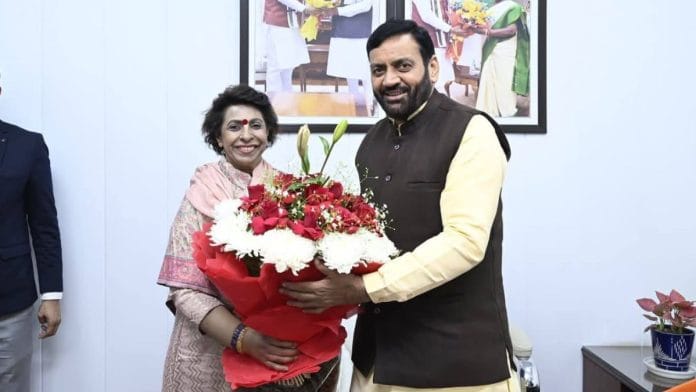Gurugram: The Haryana State Commission for Women (HSCW) has proposed mandatory pre-marital counselling for “would-be brides and bridegrooms” to mitigate the rising trends in cases of marital discord, especially among young couples.
Speaking in Panchkula Monday, HSCW Chairperson Renu Bhatia highlighted the increasing number of divorce cases in the state, many stemming from unresolved conflicts and misunderstanding among newlyweds.
She said that such counselling sessions, also undertaken by Christian couples in Kerala, aim to equip couples and their families with the tools to manage conflict, improve communication and foster mutual understanding.
The proposed sessions will cover critical topics, including emotional compatibility, financial transparency, shared responsibilities and managing expectations. “Many divorces arise due to a lack of understanding between partners,” said Bhatia. “Our goal is to strengthen relationships at their foundation and reduce family disputes.”
Experts attribute the rise in divorces to inadequate communication skills and unrealistic expectations in modern relationships, Bhatia said. “A structured pre-marital counselling programme can address these gaps, preparing couples for the realities of married life.”
She told ThePrint that her proposal was inspired by the “successful” initiative by Kerala Women’s Commission. During a meeting of heads and senior officers of state commissions at the National Commission for Women in Delhi last month, Kerala Women’s Commission Chairperson P. Sathidevi presented the outcomes of pre-marital counselling initiatives implemented in churches.
Bhatia now plans to visit Kerala with a legal expert to study the model further and adapt its best practices to Haryana’s socio-cultural context. “The HSCW will recommend a mandatory seven-day counseling programme for Hindu couples. This will provide a platform for partners to discuss their personal lives, past experiences and expectations, paving the way for healthier relationships and reducing the likelihood of conflicts.”
Asked by ThePrint if she meant that mandatory counselling would be for Hindu couples only, Bhatia clarified that she used “Hindu” as she was talking in the context of Christians in Kerala, and it would not mean that counselling would be limited to the Hindu community.
In addition to mandatory counseling, HSCW plans to launch awareness campaigns emphasising the importance of such sessions in nurturing strong and stable marriages. The commission is also consulting experts to draft detailed recommendations for the state government.
She said that the initial plan is to set up a counselling centre at the state headquarters in Panchkula, and once it is successful, more could be opened at district level.
The HSCW’s ongoing initiatives include training stakeholders on the Prevention of Sexual Harassment (POSH) Act and the Protection of Children from Sexual Offences (POCSO). “These programmes reflect our commitment to addressing key social issues comprehensively,” Bhatia told ThePrint, adding that she also presented the proposal at the NCW meeting in December 2024.
Dr. Sarika Takhar, a Haryana-based women’s rights activist and dean at NIMS Institute of Journalism and Mass Communication, Jaipur, welcomed the proposal. She also praised Kerala’s emphasis on female education and economic empowerment, noting its role in fostering more egalitarian social norms.
“Haryana can learn from Kerala’s higher female literacy rate and greater economic participation by women. However, replicating the Kerala model requires a nuanced approach tailored to Haryana’s unique cultural and socio-economic context,” she told ThePrint.
She also emphasised the broader impact of women’s empowerment, saying, “It’s not just a social goal, but also a driver of economic growth. Focus on education and employment opportunities for women could address Haryana’s skewed sex ratio and promote long-term societal change.”
Also Read: Haryana women’s commission vice-chief Sonia Aggarwal arrested over ‘bribe to settle marital dispute’






